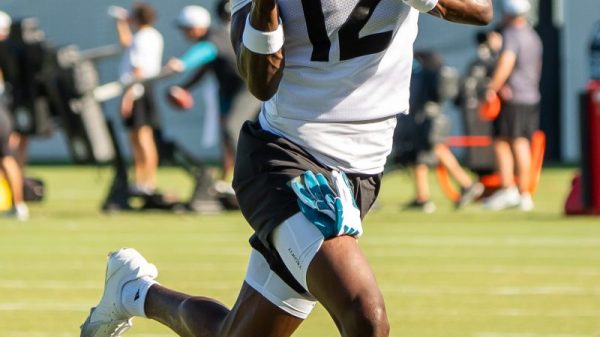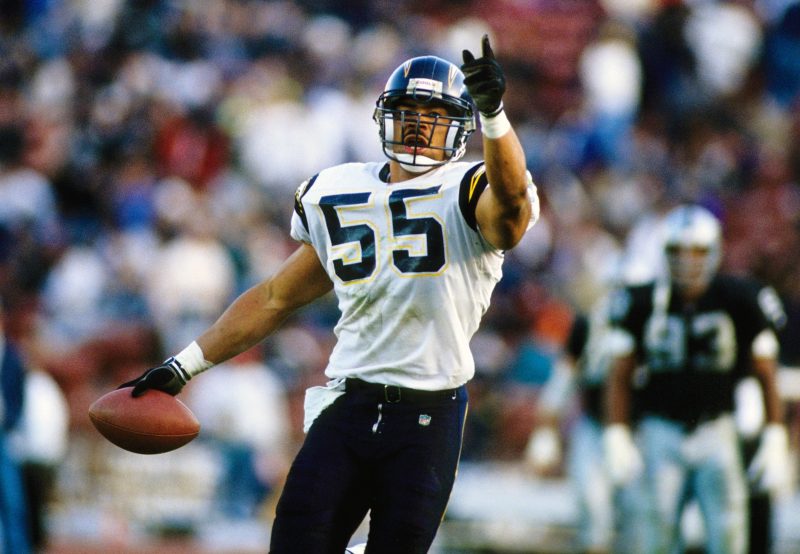Chronic traumatic encephalopathy, or CTE, returned to the national limelight this week when a gunman who believed he had the degenerative brain disease killed four people in a Manhattan skyscraper.
New York City mayor Eric Adams said that police suspect the shooter was targeting the NFL’s Manhattan office located in the building but took the wrong elevator.
CTE is linked to repeated head injuries like concussions, according to the Mayo Clinic, which has seen brains of nearly 350 former NFL players after their deaths. Boston University’s CTE center diagnosed 345 cases of CTE in the 376 former NFL players’ brains it’s studied since 2008 – a rate of 91.7%.
Of those 345 former players, there have been many notable playmakers who were diagnosed after their deaths, which is the only time CTE can be formally diagnosed.
Here’s what to know about CTE and its history with notable NFL players:
What is CTE?
CTE, which stands for chronic traumatic encephalopathy, is a degenerative brain disease that destroys nerve cells in the brain, according to the Mayo Clinic.
It is linked to repeated traumatic brain injury, such as concussions, and has been found in many former boxers, NFL players and military combat veterans after their deaths.
CTE can only be diagnosed after death, with no specific symptoms tied to the disease present while a victim is alive. However, symptoms with possible ties to CTE include memory loss, impulsive behavior and depression. According to the Mayo Clinic, any symptoms that form as a result of CTE form over several years following multiple instances of traumatic brain injury. They will not necessarily be present immediately after a concussion or other similar injury.
Notable NFL players diagnosed with CTE
Linebacker Jovan Belcher
Belcher played for the Chiefs for three full seasons and played in 11 more games for Kansas City in a fourth season before he killed his girlfriend, then himself, in December 2012. ESPN reported in 2014 that a medical examiner determined Belcher’s brain had signs of CTE.
Defensive back Irv Cross
Cross was a two-time Pro Bowler who played in the NFL for nine years. In his rookie season, Cross earned the nickname ‘Paper Head’ for the sheer number of concussions he suffered in the 1961 season alone, according to a 2018 interview he had with the Philadelphia Inquirer. Cross went on to become the first Black sports analyst on national TV after his career.
He was diagnosed with a form of dementia shortly before his death, which he believed could be attributed to CTE. He donated his brain to the Boston University CTE center, where it became one of the 345 from former NFL players diagnosed with the disease.
Offensive lineman Conrad Dobler
Dobler played 10 years in the NFL and appeared in the Pro Bowl for three consecutive years from 1975 to 1977. After he died in February 2023, he donated his brain to Boston University, where he was posthumously diagnosed with CTE.
Wide receiver Chris Henry
Henry played for the Cincinnati Bengals for five years – between 2005 and 2009 – before his death in December 2009. The wideout fell out of the back of a moving truck during a domestic dispute and a hit to his head led to his death. Six months later, the Brain Injury Research Institute of West Virginia announced Henry had developed CTE prior to his death.
Tight end Aaron Hernandez
Hernandez played three years for the Patriots starting in 2010. Four years after he was imprisoned for the murder of Odin Lloyd, Hernandez committed suicide in his cell. After his death, Boston University diagnosed the former tight end with CTE. A Hernandez family lawyer said while announcing his diagnosis that the case of CTE was ‘the most severe case they had ever seen in someone of Aaron’s age.’
Wide receiver Vincent Jackson
A former second-round pick by the then-San Diego Chargers in 2005, Jackson played 12 years in the NFL and made three Pro Bowls by the time he retired in 2016. He died in 2021, aged 38, from chronic alcohol use, according to a medical examiner and was diagnosed with CTE by Boston University’s CTE Center.
Offensive lineman Terry Long
Long played his entire eight-year career for the Pittsburgh Steelers. In 2005, 14 years after his final season, he committed suicide by drinking an entire gallon of antifreeze shortly after an indictment for arson and fraud charges. His autopsy, performed by neuropathologist and CTE discoverer Bennet Omalu, revealed that he had the degenerative brain disease.
The gunman in Monday night’s mass shooting in Manhattan named Long by name in a rambling note found in his pocket.
Linebacker Junior Seau
Seau’s career spanned nearly three decades – from 1990 to 2009 – and was marked by numerous accolades, including first-team All-Pro recognition six times, 12 consecutive Pro Bowl seasons and a Walter Payton Man of the Year award. His 20-year career included two Super Bowl appearances: one with the Chargers in Super Bowl 29 and another with the Patriots in Super Bowl 42.
Seau committed suicide in 2012, and his family donated his brain tissue to the NIH’s National Institute of Neurological Disorders and Stroke. A year later, they revealed the NIH had found signs of CTE.
The linebacker was posthumously enshrined into the Pro Football Hall of Fame in 2015.
Wide receiver Demaryius Thomas
By the end of Thomas’s nine years with the Denver Broncos, he had risen to second in all-time receiving yards in the team’s history. He won a Super Bowl with Denver after the 2015 season and played four more years that included brief tenures with the Houston Texans and New York Jets. He died in December 2021 from what police called a ‘medical issue’ that stemmed from a 2019 car crash. His brain tested positive for signs of CTE after its donation to Boston University.
Tight end Frank Wycheck
Wycheck was an 11-year NFL veteran who earned three Pro Bowl nods during his career and is a member of the Titans/Oilers Ring of Honor. He was the Titans’ leading receiver for three years (1999-2001) and was the player who threw the famous lateral pass in the ‘Music City Miracle’ play that led Tennessee to a playoff win over the Buffalo Bills. Wycheck died in 2023 after falling and hitting his head. In January 2025, ESPN reported that his family confirmed Wycheck had been diagnosed with CTE after his death.
























